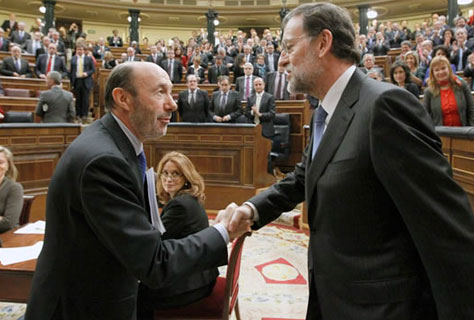13.05.2014 - 11:45
Former Spanish president and Socialist (PSOE) leader Felipe González shook up the electoral campaign for the PSOE when he said that he was in favor of a coalition government between Socialists (PSOE) and the PP if Spain needs it. Currently, the Socialists are trying to distance themselves from the PP, and don’t want their position against the economic European troika and austerity policies to lose credibility. In that context, González’ words felt like friendly fire to the PSOE. Indeed, current PSOE leader Alfredo Pérez Rubalcaba was quick to disagree with González. PP leaders, however, were not averse to the suggestion. The underlying theme that joins the two groups are the desire to preserve the territorial unity of the Spanish State and a fear that the two major political parties and indeed the two-party system is losing ground to other parties.
Preserving the unity of the Spanish State
The unity of the Spanish State is one of the primary motivations drawing the PSOE and PP together. Probably the most important one. In fact, Felipe González, in his interview with La Sexta TV on Sunday, said it was very important to maintain the territorial integrity of the Spanish State, though he did not mention either Catalonia or the Basque Country. He said, “If a country has to join forces to face a crisis that is not the crisis that we are living through, which has already been very difficult, but rather a crisis of defining the country… What do we want to be? What do we have to offer to those who are under forty-five, who didn’t participate in the great effort of the transition [from Franco to democracy], to those who did not take part in that aspect of Spanish life? Will we once again, like we’ve done since 1812, resign ourselves to the fact that the constitutions are finished, rather than reform them?” Here is the excerpt of the interview (in Spanish):
Rubalcaba’s answer yesterday: “As long as I am PSOE secretary general, there will be no coalition government, because I believe it would be neither good for Spain, nor good for PSOE.” No important Socialist leader sided with González. At the same time, you don’t have to go very far back to find declarations from the current secretary general in which he offered support to the PP in order to safeguard Spanish unity, though he didn’t go so far as to offer a coalition. It was just this past December, in an interview with ABC newspaper, when he said, “[Rajoy] knows that when we are talking about matters of state he can always count on PSOE […]. We have always and will always work for the unity of Spain.”
The threat of lost predominance
There is another factor that might explain the inclination of PP and PSOE members toward a hypothetical coalition government: the increasing fragmentation of the political landscape and the consequent weakening of the two-party system—and hence, the relay of power from one of the two parties to the other and back again.
Polls periodically indicate that both PP and PSOE will lose voters, and the first polls on the European elections confirm the trend: with nuances, everyone agrees that both PP and PSOE will fall about 9 points with respect to 2009. In contrast, voters are expected to flock to Esquerra Unida and Iniciativa, UPyD, ERC…





